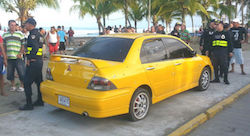Costa Rica is bolstering security in a Caribbean province that has become a hotspot for criminal activity and drug trafficking, reflecting concern among local officials as they strategize about how to avoid high levels of violence seen elsewhere in Central America.
Following an October 2 shootout on a beach that left five people dead, top Costa Rican security officials met in Limón on October 5 to discuss the city’s security situation and formulate actions for dismantling criminal organizations, reported La Nación.
That same day, 400 additional police officers moved into the city to reinforce security operations and help combat criminal gangs.
Costa Rica Police Director Juan José Andrade said the extra police in Limón would focus on two areas. The first is to help gather intelligence in support of judicial investigations; the second is to maintain a security presence and control areas with heightened levels of criminal activity and violence.
“We will not give [Limón criminal groups] space,” said Costa Rican Security Minister Gustavo Mata. “We will remain in the province until they leave.”
The heightened police presence is part of a strategy developed by Costa Rican officials in October 2015, which saw the creation of the Special Operations Force (Fuerza Especial Operativa – FEO) to disrupt criminal groups in urban areas across the country.
Officials are also developing a tip line for Limón citizens to report criminal activity anonymously.
“We are ready to put an end to” the criminals, said Attorney General Jorge Chavarría Guzmán. “We are not afraid and will make every effort to put them in prison.”
Guzmán added there are two main criminal groups that dominate Limón, but refused to give further details citing ongoing investigations.
InSight Crime Analysis
Limón — the name of both a province and its capital city — sits along the Caribbean coast and is one of Costa Rica’s main seaports. Its strategic location along trafficking routes has put it at the center of Costa Rica’s growing involvement in the regional drug trade.
For instance, drug planes loaded with Colombian cocaine have been seized in the province, and past reports have indicated that marijuana has become one of the principal crops for Limón’s indigenous populations.
The expansion of drug trafficking in Costa Rica, and an alarming rise in insecurity, has sparked concern among local officials, who are anxious to avoid the extreme levels of violence seen in Central America’s Northern Triangle nations of El Salvador, Guatemala, and Honduras.
SEE ALSO: Coverage of Costa Rica
To be sure, on October 3, following the shootout in Limón, Security Minister Mata lamented that his agency lacks sufficient financial and human resources to combat growing criminal violence, threatening to resign if the ministry was not allocated additional resources soon.
In response, Costa Rican President Luis Guillermo Solís expressed support for Mata, saying his comments “demonstrate the gravity of the situation in which we find ourselves.”
Solís also called on lawmakers to quickly approve new taxes to help boost the security budget.

